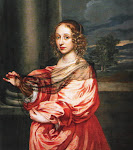 François VI, prince de Marsillac, later duc de La Rochefoucauld was born on September 15th 1613 in Paris. A soldier, courtier and latterly, a writer of those famous maxims, François was influenced by three great women – Marie de Rohan, Duchesse de Chevreuse – Anne of Austria – Anne Genevieve de Bourbon-Condé, Duchess de Longueville.
François VI, prince de Marsillac, later duc de La Rochefoucauld was born on September 15th 1613 in Paris. A soldier, courtier and latterly, a writer of those famous maxims, François was influenced by three great women – Marie de Rohan, Duchesse de Chevreuse – Anne of Austria – Anne Genevieve de Bourbon-Condé, Duchess de Longueville.Here he describes himself in his own words.
"I am," he says, "of a medium height, active, and well-proportioned. My complexion dark, but uniform, a high forehead; and of moderate height, black eyes, small, deep set, eyebrows black and thick but well placed. I am rather embarrassed in talking of my nose, for it is neither flat nor aquiline, nor large; nor pointed: but I believe, as far as I can say, it is too large than too small, and comes down just a trifle too low. I have a large mouth, lips generally red enough, neither shaped well nor badly. I have white teeth, and fairly even. I have been told I have a little too much chin. I have just looked at myself in the glass to ascertain the fact, and I do not know how to decide. As to the shape of my face, it is either square or oval, but which I should find it very difficult to say. I have black hair, which curls by nature, and thick and long enough to entitle me to lay claim to a fine head. I have in my countenance somewhat of grief and pride, which gives many people an idea I despise them, although I am not at all given to do so. My gestures are very free, rather inclined to be too much so, for in speaking they make me use too much action....
The Prince de Marsillac was a fine man and is wonderful character for a novelist to write about. I adore him.
And in case any should think that both he and I are biased in his favour, his most implacable enemy, Cardinal de Retz, described him this way...
"In M. de la Rochefoucauld there was ever an indescribable something. From his infancy he always wanted to be mixed up with plots, at a time when he could not understand even the smallest interests (which has indeed never been his weak point,) or comprehend greater ones, which in another sense has never been his strong point. He was never fitted for any matter, and I really cannot tell the reason. His glance was not sufficiently wide, and he could not take in at once all that lay in his sight, but his good sense, perfect in theories, combined with his gentleness, his winning ways, his pleasing manners, which are perfect, should more than compensate for his lack of penetration. He always had a natural irresoluteness, but I cannot say to what this irresolution is to be attributed. It could not arise in him from the wealth of his imagination, for that was anything but lively. I cannot put it down to the barrenness of his judgment, for, although he was not prompt in action, he had a good store of reason. We see the effects of this irresolution, although we cannot assign a cause for it. He was never a general, though a great soldier; never, naturally, a good courtier, although he had always a good idea of being so. He was never a good partisan, although all his life engaged in intrigues. That air of pride and timidity which your see in his private life, is turned in business into an apologetic manner. He always believed he had need of it; and this, combined with his ‘Maxims,' which show little faith in virtue, and his habitual custom, to give up matters with the same haste he undertook them, leads me to the conclusion that he would have done far better to have known his own mind, and have passed himself off, as he could have done, for the most polished courtier, the most agreeable man in private life that had appeared in his century."
De Retz was well-known for writing sharp and cruel character profiles. This one could be a lot worse considering the hatred shared between these two men.
Maxim No.245 ~ There is great ability in knowing how to conceal one's ability.






No comments:
Post a Comment